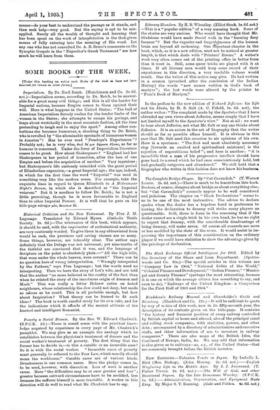Imperialism. By Dr. Emil Reich. (Hutchinson and Co. 2s. 6d.
net.)—Imperialism seems, according to Dr. Reich, to be answer- able for a great many evil things; and this is all the harder for Imperial nations, because Empire comes to them against their will. Here is what happens in the United States: "The bull of American Imperialism fiercely rushes for the tender limbs of the woman in the States ; she attempts to escape his gorings, and leaps about wretchedly in the most eccentric fashion, all the time pretending to laugh and to enjoy the sport." Among other con- tortions she becomes humorous, a shocking thing to Dr. Reich, who is revolted by "the abominable spectacle of humorous women in America"! Has he ever read " Penelope's Experiences" ? Probably not; he is very wise, Oeol U;ay Allgova Sinai', as far as humour is concerned. Under the force of Imperialism literature ceases to be groat. How about Shakespeare ? "England had her Shakespeare in her period of transition, after the loss of one Empire and before the acquisition of another." Very ingenious ; but Shakespeare's life curiously coincided with the great period of Elizabethan expansion,—a great Imperial age ; the age, indeed, in which for the first time the word "Imperial" was used in something very like the modern sense. For example, take the exquisite lines in regard to Queen Elizabeth in A Midsummer Night's Dream, in which she is described as "the Imperial votaress." But it is needless to follow. Dr. Reich; he is not a little provoking, though he is more favourable to England than to other Imperial Powers. It is well that he puts on his title-page xdrator far, eucovcrov U.






































 Previous page
Previous page